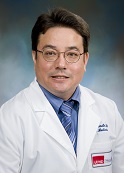
Bernard Karnath, MD, FACPProfessor, John Sealy School of Medicine
Internal Medicine
AMT Director FY18-20
Dr. Karnath is a Professor of Medicine in the Department of Internal Medicine. His educational background includes a BS in Biology from Texas A&M University in Kingsville, Texas (1989) and MD degree from The University of Texas Medical Branch (1994). His educational activities in the school of medicine include the Practice of Medicine year 2 course and the Internal Medicine clerkship. He is co-director for both courses. Dr. Karnath has been involved in developing multiple educational curricula while at UTMB. His goal for clinical education is to instill the standards set by Sir William Osler for patient evaluations. Dr. Karnath is involved with teaching the art and science of medicine by helping students to understand the value of bedside diagnostic skills. He is editor of Hospital Physician’s Review of Clinical Signs, a bi-monthly publication on evidence-based physical diagnosis.
Dr. Karnath has been the recipient of numerous honors and awards. Some of these include the Golden Apple Award
Pre-Clinical Professor for the School of Medicine in 2004, 2006, 2007, 2008, and 2009 and the Golden Apple Award Clinical Professor for the School of Medicine in 2006, 2007, 2008, and 2009. Dr. Karnath has also been Presented with the James W. Powers Memorial Award honoring a teacher of clinical services who, by his instruction and example, best exemplifies the practice of the art and science of medicine. Award presented at the School of Medicine commencement ceremony on May 31, 2008 and May 30, 2009 by the graduating class. He was inducted into the Academy of Master Teachers in 2009.
Learner Types: JSSOM - Medical Students - Pre-Clerkship, JSSOM - Medical Students - Clinical Years, JSSOM - Residency/Fellowships, Faculty/Educator Development, Continuing Ed/Professional Development.
Assessment of Learners: Clinical Skills Assessment, Debriefing Techniques, Feedback to Learners, Examination Blueprints, Observed Structured Clinical Evaluations (OSCE), Standardized Patient Assessment, Test-Writing.
Advancement/Promotion: CV Development, Educator Portfolio, Promotion/Tenure for Educators, Peer Observation of Teaching.
Curriculum: Objectives.
Instructional Methods: Audience Response Systems, Case-Based Teaching, Interactive Teaching - Small Group, Interactive Teaching - Large Group, Slide Development - best practices, Workshop Development.
Scholarship - Ed Research or Curriculum Innovation: Manuscript Writing, Poster Development, Presentation Skills.
Special Content: Faculty Development - Teaching Skills, Learners as Teachers.